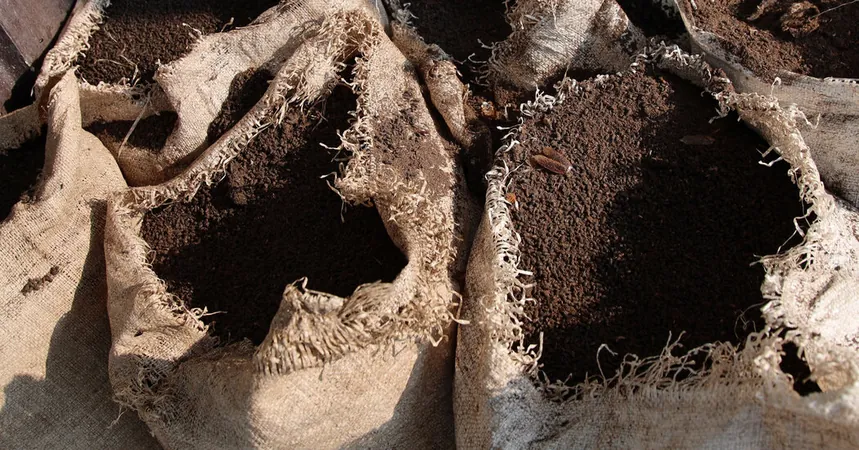
Shocking Link: Bat Feces Fertilizer Claims Two Lives Amidst Rising Cannabis Cultivation Trends!
2024-12-19
Author: Kai
Title: Shocking Link: Bat Feces Fertilizer Claims Two Lives Amidst Rising Cannabis Cultivation Trends!
In a chilling incident that has drawn attention from health officials, two men tragically died after contracting a rare fungal infection linked to exposure to bat feces, or guano, used in their cannabis cultivation. This startling revelation was detailed in a recent study published in the journal *Open Forum Infectious Diseases*.
Both men, residents of Rochester, New York, succumbed to histoplasmosis—an infection characterized by pneumonia caused when spores of the fungus *Histoplasma capsulatum* are inhaled. This dangerous fungus is commonly found in bat droppings, raising serious health concerns for cannabis growers who are increasingly turning to guano as a natural fertilizer.
The medical report clarifies that the cases were independent of each other. The first victim, a 64-year-old who had a serious bat infestation in his attic, had been planning to use the feces as fertilizer. This man experienced numerous health issues, including a significant weight loss of 35 pounds, and was later hospitalized with complications from lesions that formed on his pancreas and abdomen. Despite initial treatment, he tragically returned to the hospital and ultimately passed away.
In a similarly alarming situation, another victim, a 59-year-old heavy smoker with emphysema, reported using guano purchased online for his cannabis plants. He was hospitalized for respiratory failure and underwent antifungal treatment but continued to suffer severe breathing difficulties before receiving comfort care and passing away.
Dr. Paulina Sudnik, an infectious disease fellow at the University of Rochester Medical Center, co-authored the report and emphasized that although histoplasmosis is relatively rare, the rising popularity of bat guano as a fertilizer can potentially lead to an increase in infections, especially among those unaware of the risks involved in handling it.
The nutrient-rich substance, which contains high levels of nitrogen, phosphate, and potassium, must be handled with caution—preferably in a well-ventilated area while wearing protective gear such as masks and gloves, according to Dr. Sudnik.
Disturbingly, an informal survey conducted by researchers found that many bat guano products sold both in stores and online lacked crucial safety warnings and guidelines for proper handling. The researchers are now calling on regulators to mandate such warnings on product labels to better inform consumers.
Histoplasmosis symptoms can include chest pain, fatigue, fever, and coughing, typically presenting between 3 to 17 days after exposure. The CDC warns that while not everyone infected will show symptoms, those with compromised immune systems face a heightened risk of severe complications.
Compounding the issue, histoplasmosis is often misdiagnosed or identified late due to its symptom overlap with common bacterial and viral infections. If untreated, the illness can lead to long-term pulmonary issues or even progress to other severe conditions, such as meningitis.
While most cases of histoplasmosis in the United States are reported in the Mississippi and Ohio River Valleys—where a staggering 60 to 90 percent of residents may be exposed in their lifetime—the recent fatalities serve as a stark reminder of the potential dangers lurking in seemingly innocuous home gardening practices.
Anyone involved in cannabis cultivation, particularly using natural fertilizers like bat guano, should be acutely aware of the risks and implement safeguards to protect their health. Stay informed, stay safe, and be cautious as this gardening trend continues to grow!


 Brasil (PT)
Brasil (PT)
 Canada (EN)
Canada (EN)
 Chile (ES)
Chile (ES)
 España (ES)
España (ES)
 France (FR)
France (FR)
 Hong Kong (EN)
Hong Kong (EN)
 Italia (IT)
Italia (IT)
 日本 (JA)
日本 (JA)
 Magyarország (HU)
Magyarország (HU)
 Norge (NO)
Norge (NO)
 Polska (PL)
Polska (PL)
 Schweiz (DE)
Schweiz (DE)
 Singapore (EN)
Singapore (EN)
 Sverige (SV)
Sverige (SV)
 Suomi (FI)
Suomi (FI)
 Türkiye (TR)
Türkiye (TR)